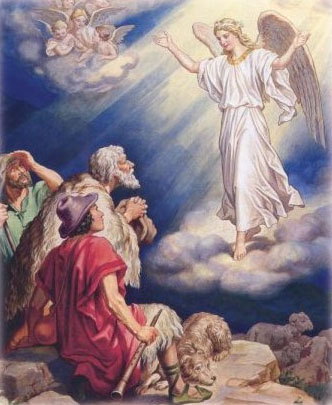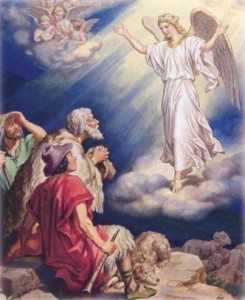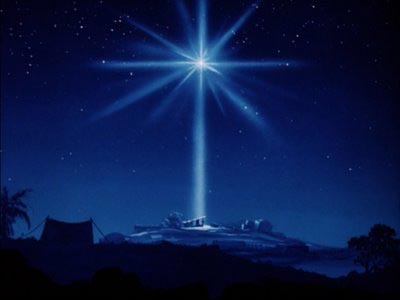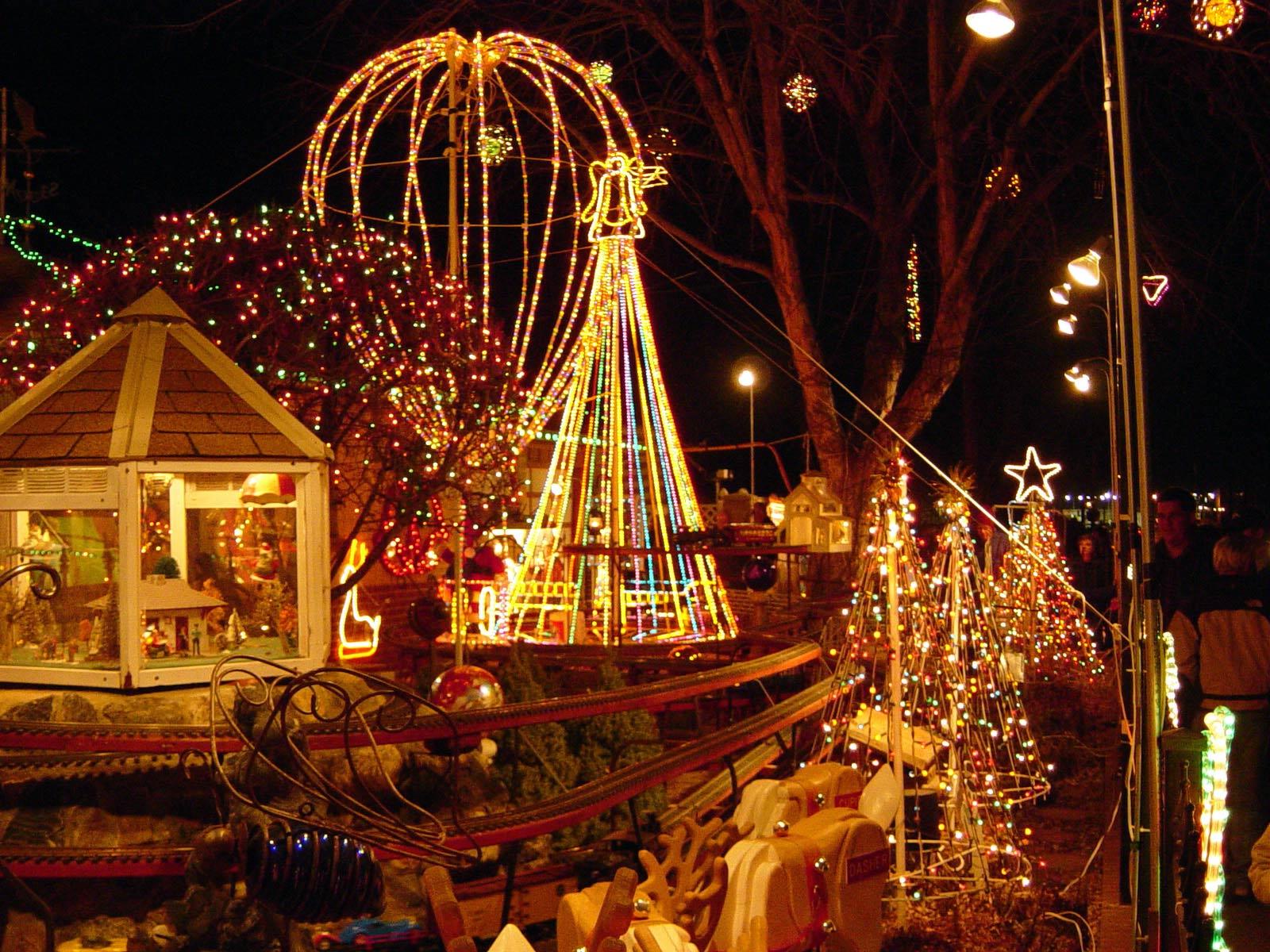 The practice of decorating Christmas trees seems to have originated during the Middle Ages in Germany, when people would hang fruit, nuts, sweets, and paper flowers all over the tree for children to enjoy. Â A legend was also born around this time that on the night Jesus was born, every tree in every forest all across the world bore their most delicious fruit.
The practice of decorating Christmas trees seems to have originated during the Middle Ages in Germany, when people would hang fruit, nuts, sweets, and paper flowers all over the tree for children to enjoy. Â A legend was also born around this time that on the night Jesus was born, every tree in every forest all across the world bore their most delicious fruit.
The song “O Tannenbaum,” known as “O Christmas Tree” in English, is an old German folk song. Although the original German lyrics written by organist Ernst Anschütz in 1824 had nothing to do with the decorated Christmas trees (tannenbaum simply means “fir tree”), Anschütz himself later added more Christmas-themed lyrics. In the late 19th and early 20th century, the song came to be known as a Christmas carol.
Podcast: Play in new window | Download
Lyrics
O Christmas Tree! O Christmas Tree!
Thy leaves are so unchanging;
O Christmas Tree! O Christmas Tree!
Thy leaves are so unchanging;
Not only green when summer’s here,
But also when ’tis cold and drear.
O Christmas Tree! O Christmas Tree!
Thy leaves are so unchanging!
O Christmas Tree! O Christmas Tree!
Much pleasure thou can’st give me;
O Christmas Tree! O Christmas Tree!
Much pleasure thou can’st give me;
How often has the Christmas tree
Afforded me the greatest glee!
O Christmas Tree! O Christmas Tree!
Much pleasure thou can’st give me.
O Christmas Tree! O Christmas Tree!
Thy candles shine so brightly!
O Christmas Tree! O Christmas Tree!
Thy candles shine so brightly!
From base to summit, gay and bright,
There’s only splendor for the sight.
O Christmas Tree! O Christmas Tree!
Thy candles shine so brightly!
O Christmas Tree! O Christmas Tree!
How richly God has decked thee!
O Christmas Tree! O Christmas Tree!
How richly God has decked thee!
Thou bidst us true and faithful be,
And trust in God unchangingly.
O Christmas Tree! O Christmas Tree!
How richly God has decked thee!
 It was a time of intense sorrow and despair in Henry Wadsworth Longfellow’s life. His wife had tragically died in a fire in 1861. The American Civil War had just broken out, and his oldest son Charles had decided to join the Union cause without his father’s blessing. He was severely wounded in battle after several months of fighting. For Longfellow, this was just an endless punishment. In 1864, he sat down at his desk and penned the poem “Christmas Bells.” In this poem, Longfellow somberly recognizes that God is not dead, that right will prevail, and bring peace and goodwill to men. This is the message of Christmas and its promise of new life. The poem has been set to a few tunes, the two most common being the English organist John Baptiste Calkin’s melody in the 1870s, and Johnny Marks’ traditional melody in the 1950s.
It was a time of intense sorrow and despair in Henry Wadsworth Longfellow’s life. His wife had tragically died in a fire in 1861. The American Civil War had just broken out, and his oldest son Charles had decided to join the Union cause without his father’s blessing. He was severely wounded in battle after several months of fighting. For Longfellow, this was just an endless punishment. In 1864, he sat down at his desk and penned the poem “Christmas Bells.” In this poem, Longfellow somberly recognizes that God is not dead, that right will prevail, and bring peace and goodwill to men. This is the message of Christmas and its promise of new life. The poem has been set to a few tunes, the two most common being the English organist John Baptiste Calkin’s melody in the 1870s, and Johnny Marks’ traditional melody in the 1950s.
 Felix Mendelssohn composed the tune to this song in 1840, but the original tune was a solemn one written by Charles Wesley at the inception of the carol one hundred years earlier in 1739. The lyrics have changed as well. The original lyrics by Wesley read “Hark, how all the welkin [heaven] rings,” but his colleague George Whitefield changed this line to the one we know today. Mendelssohn’s song was originally part of a cantata commemorating printer Johann Gutenberg. The music familiar to us was applied to the lyrics 15 years after Mendelssohn’s composition by W.H. Cummings, an English musician.
Felix Mendelssohn composed the tune to this song in 1840, but the original tune was a solemn one written by Charles Wesley at the inception of the carol one hundred years earlier in 1739. The lyrics have changed as well. The original lyrics by Wesley read “Hark, how all the welkin [heaven] rings,” but his colleague George Whitefield changed this line to the one we know today. Mendelssohn’s song was originally part of a cantata commemorating printer Johann Gutenberg. The music familiar to us was applied to the lyrics 15 years after Mendelssohn’s composition by W.H. Cummings, an English musician. Johnny Marks created an undeniable hit with “Rudolph the Red-Nosed Reindeer” when Gene Autry debuted it in New York City’s Madison Square Garden in 1949. The star of one of the best-selling and most-recorded Christmas songs of all time, Rudolph has found its way into the hearts and delight of children and adults all over the world, and inspired several television specials, numerous toys, clothing, and other merchandise bearing the famous reindeer and his glowing red nose.
Johnny Marks created an undeniable hit with “Rudolph the Red-Nosed Reindeer” when Gene Autry debuted it in New York City’s Madison Square Garden in 1949. The star of one of the best-selling and most-recorded Christmas songs of all time, Rudolph has found its way into the hearts and delight of children and adults all over the world, and inspired several television specials, numerous toys, clothing, and other merchandise bearing the famous reindeer and his glowing red nose. A young boy just out of high school, Gene Autry worked in a railway telegraph office in a Midwest Oklahoma town. Occasionally he’d pluck away at his guitar and sing during slow days. One night, a stranger appeared, listened while Autry performed, and said, “Young feller, you’re wasting your time here.” It was Will Rogers.
A young boy just out of high school, Gene Autry worked in a railway telegraph office in a Midwest Oklahoma town. Occasionally he’d pluck away at his guitar and sing during slow days. One night, a stranger appeared, listened while Autry performed, and said, “Young feller, you’re wasting your time here.” It was Will Rogers. Everyone knows what happens if you pout or cry around Christmastime: Santa Claus passes you by, that’s what. “Santa Claus Is Coming to Town” was written by J. Fred Coots and Haven Gillespie in 1934. Coots had been writing material for Eddie Cantor, a comedian with a radio show. Coots shared this song with Cantor, who nearly turned it down. Cantor’s wife, Ida, convinced him to air the song, and it was an instant smash hit with orders for 100,000 copies of sheet music the next day, and more than 400,000 copies sold by Christmas. The song is a traditional standard at Christmas time, and has been covered by numerous recording artists. In 1970 Rankin-Bass produced an hour-long animated television special based on the song, with narrator Fred Astaire telling the original story of Santa Claus.
Everyone knows what happens if you pout or cry around Christmastime: Santa Claus passes you by, that’s what. “Santa Claus Is Coming to Town” was written by J. Fred Coots and Haven Gillespie in 1934. Coots had been writing material for Eddie Cantor, a comedian with a radio show. Coots shared this song with Cantor, who nearly turned it down. Cantor’s wife, Ida, convinced him to air the song, and it was an instant smash hit with orders for 100,000 copies of sheet music the next day, and more than 400,000 copies sold by Christmas. The song is a traditional standard at Christmas time, and has been covered by numerous recording artists. In 1970 Rankin-Bass produced an hour-long animated television special based on the song, with narrator Fred Astaire telling the original story of Santa Claus. On December 24, 1818, the carol “Stille Nacht! Heilige Nacht” was heard for the first time in a village church in Oberndorf, Austria. The congregation at that Midnight Mass in St. Nicholas Church listened as the voices of the assistant pastor, Fr. Joseph Mohr, and the choir director, Franz Xaver Gruber, rang through the church to the accompaniment of Fr. Mohr’s guitar. On each of the six verses, the choir repeated the last two lines in four-part harmony.
On December 24, 1818, the carol “Stille Nacht! Heilige Nacht” was heard for the first time in a village church in Oberndorf, Austria. The congregation at that Midnight Mass in St. Nicholas Church listened as the voices of the assistant pastor, Fr. Joseph Mohr, and the choir director, Franz Xaver Gruber, rang through the church to the accompaniment of Fr. Mohr’s guitar. On each of the six verses, the choir repeated the last two lines in four-part harmony. “Happy Xmas (War Is Over)” was recorded by John Lennon, Yoko Ono and the Plastic Ono Band in late October 1971, with the help of producer Phil Spector. It features soaring, heavily echoed vocals, and a sing-along chorus. The children singing in the background were from the Harlem Community Choir and are credited on the song’s single. The song is a protest song about the Vietnam War, based on a campaign in late 1969 by John Lennon and Yoko Ono, who rented billboards and posters in eleven cities around the world that read: “WAR IS OVER! (If You Want It) Happy Christmas from John and Yoko”. The cities included New York, Los Angeles, Toronto, Rome, Athens, Amsterdam, Berlin, Paris, London, Tokyo and Hong Kong. At the time the US was deeply entrenched in the unpopular Vietnam War. The line “War is over, if you want it, war is over, now!”, as sung by the background vocals, was taken directly from the billboards.
“Happy Xmas (War Is Over)” was recorded by John Lennon, Yoko Ono and the Plastic Ono Band in late October 1971, with the help of producer Phil Spector. It features soaring, heavily echoed vocals, and a sing-along chorus. The children singing in the background were from the Harlem Community Choir and are credited on the song’s single. The song is a protest song about the Vietnam War, based on a campaign in late 1969 by John Lennon and Yoko Ono, who rented billboards and posters in eleven cities around the world that read: “WAR IS OVER! (If You Want It) Happy Christmas from John and Yoko”. The cities included New York, Los Angeles, Toronto, Rome, Athens, Amsterdam, Berlin, Paris, London, Tokyo and Hong Kong. At the time the US was deeply entrenched in the unpopular Vietnam War. The line “War is over, if you want it, war is over, now!”, as sung by the background vocals, was taken directly from the billboards. The text to “O Come All Ye Faithful” was originally written in Latin (“Adeste Fideles”) and is attributed to John Francis Wade, an 18th-century hymnist. It was first published in a collection known as “Cantus Diversi” in 1751.
The text to “O Come All Ye Faithful” was originally written in Latin (“Adeste Fideles”) and is attributed to John Francis Wade, an 18th-century hymnist. It was first published in a collection known as “Cantus Diversi” in 1751. The words to “O Come, O Come, Emmanuel” are a translation of the Catholic Latin text “Veni, veni, Emmanuel” by John Mason Neale in the mid-19th century. Their origins are very old indeed, and may date as far back as the 12th century. They were of such importance in medieval days that in monasteries a separate stanza, to be sung from December 16 through December 23, was assigned to each of the most pious monks. In the 1800s, a musical setting that would accommodate the stanzas and the refrain “Rejoice! Rejoice! Emmanuel shall come to thee O Israel” was fashioned out of some plainsong sequences. (There was no refrain in the original Latin.) And, since plainsong has no measures and no specified rhythmic scheme, the quality of this hymn is always flowing and free.
The words to “O Come, O Come, Emmanuel” are a translation of the Catholic Latin text “Veni, veni, Emmanuel” by John Mason Neale in the mid-19th century. Their origins are very old indeed, and may date as far back as the 12th century. They were of such importance in medieval days that in monasteries a separate stanza, to be sung from December 16 through December 23, was assigned to each of the most pious monks. In the 1800s, a musical setting that would accommodate the stanzas and the refrain “Rejoice! Rejoice! Emmanuel shall come to thee O Israel” was fashioned out of some plainsong sequences. (There was no refrain in the original Latin.) And, since plainsong has no measures and no specified rhythmic scheme, the quality of this hymn is always flowing and free. “Jingle Bell Rock” was written by Joe Beal, a New England-born public relations man, in 1957. It’s in the “rockabilly” style, and was written during a time when rock-and-roll was coming on strong and casting its new rhythmic vitality over everything, including the Christmas season. Joe Beal collaborated with Jim Boothe, a Texas writer in the advertising business, to create this unique novelty, which became a best-selling record for Bobby Helms.
“Jingle Bell Rock” was written by Joe Beal, a New England-born public relations man, in 1957. It’s in the “rockabilly” style, and was written during a time when rock-and-roll was coming on strong and casting its new rhythmic vitality over everything, including the Christmas season. Joe Beal collaborated with Jim Boothe, a Texas writer in the advertising business, to create this unique novelty, which became a best-selling record for Bobby Helms. The words to the triumphant song “Joy to the World” are by English hymn writer Isaac Watts, based on Psalm 98 in the Bible. The song was first published in 1719. Watts wrote the words of “Joy to the World” as a hymn glorifying Christ’s triumphant return at the end of the age, rather than a Christmas song celebrating his first coming as a babe born in a stable. Only the second half of Watts’ lyrics are still used today.
The words to the triumphant song “Joy to the World” are by English hymn writer Isaac Watts, based on Psalm 98 in the Bible. The song was first published in 1719. Watts wrote the words of “Joy to the World” as a hymn glorifying Christ’s triumphant return at the end of the age, rather than a Christmas song celebrating his first coming as a babe born in a stable. Only the second half of Watts’ lyrics are still used today. You may know Meredith Wilson as the composer of the Broadway hit The Music Man in 1957, but before that in 1951 he had already achieved success with “It’s Beginning to Look a Lot Like Christmas.” Perry Como and The Fontane Sisters with Mitchell Ayres & His Orchestra on September 10, 1951. Bing Crosby recorded a version on October 1, 1951 which was also widely played.
You may know Meredith Wilson as the composer of the Broadway hit The Music Man in 1957, but before that in 1951 he had already achieved success with “It’s Beginning to Look a Lot Like Christmas.” Perry Como and The Fontane Sisters with Mitchell Ayres & His Orchestra on September 10, 1951. Bing Crosby recorded a version on October 1, 1951 which was also widely played. “Let It Snow!” was written by lyricist Sammy Cahn and composer Jule Styne in July 1945 in Hollywood, California during one of the hottest days on record.
“Let It Snow!” was written by lyricist Sammy Cahn and composer Jule Styne in July 1945 in Hollywood, California during one of the hottest days on record. The “Coventry Carol” is a Christmas carol dating from the 16th Century. The carol was performed in Coventry as part of a play called The Pageant of the Shearmen and Tailors. The play depicts the Christmas story from chapter two in the Gospel of Matthew. The carol refers to the Massacre of the Innocents, in which Herod orders all male infants under the age of two in Bethlehem to be killed. The lyrics of this haunting carol represent a mother’s lament for her doomed child. It is the only carol that has survived from this play. Our knowledge of the lyrics is in considerable doubt, as the only surviving manuscript copy was burnt in 1875, and only two poor quality transcriptions remain from the early nineteenth century.
The “Coventry Carol” is a Christmas carol dating from the 16th Century. The carol was performed in Coventry as part of a play called The Pageant of the Shearmen and Tailors. The play depicts the Christmas story from chapter two in the Gospel of Matthew. The carol refers to the Massacre of the Innocents, in which Herod orders all male infants under the age of two in Bethlehem to be killed. The lyrics of this haunting carol represent a mother’s lament for her doomed child. It is the only carol that has survived from this play. Our knowledge of the lyrics is in considerable doubt, as the only surviving manuscript copy was burnt in 1875, and only two poor quality transcriptions remain from the early nineteenth century.